Five big questions that will soon need answering
- Published
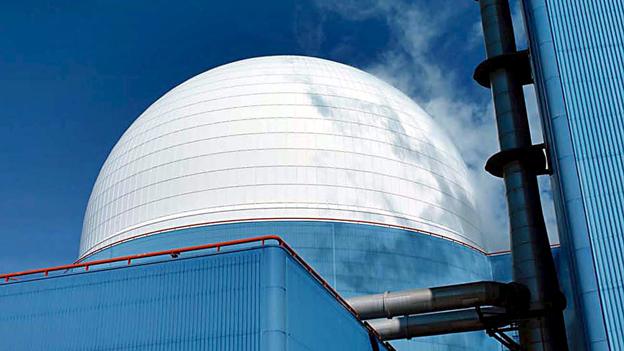
Lots and lots of issues were debated by the political parties in the lead-up to the general election. But other things were noticeably absent. Here are five key issues that were little mentioned, but we are bound to hear more about soon.
Will there be another runway at Heathrow?
Airport expansion in south-east England has been a controversial subject for years.
The Labour government planned to build a third runway at Heathrow, but that was scrapped when the coalition government came to power in 2010. Since then, the Airports Commission - which was created by the government in 2012 - has launched a number of consultations on the UK's existing airport capacity.
But even at that time, the government said the final decision on UK airport expansion wouldn't be taken until after the general election.
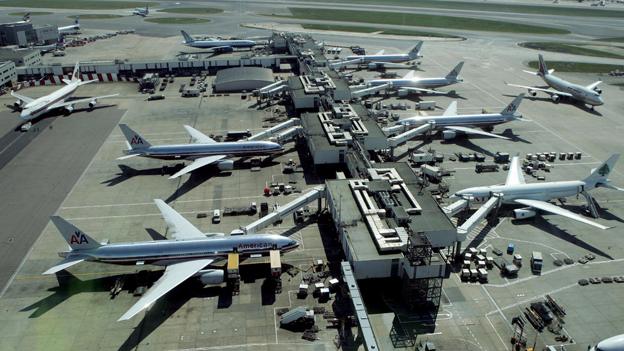
In 2013, a review concluded, external one additional runway needed to be created in the South East by 2030. Heathrow Airport handled 72.3 million passengers in 2014 and already operates at 98% of its capacity. By 2030, all the major South East airports are forecast to be full, according to the commission.
Demand for air travel is forecast to increase within the range of 1-3% a year up to 2050, compared with historical growth rates of 5% a year over the past 40 years.
The commission shortlisted three options: Gatwick Airport's proposal for a new runway to the south of the existing runway, Heathrow Airport's proposal for one new 3,500m runway to the north-west of the existing airport, and Heathrow Hub's proposal to extend the existing northern runway to at least 6,000m.
Boris Johnson's idea of an island airport in the Thames estuary was crossed off the list because of uncertainties over the price tag and environmental concerns.
The public consultation has now closed, external, and a recommendation is due to be published this summer. However, the commission is now seeking views on new evidence, external relating to the air quality assessment of the three shortlisted options.
It's not hard to fathom why the government - and indeed Labour and the Lib Dems - might have wanted to postpone the debate about airport expansion until after the election.
While most people wouldn't dispute something needs to be done to meet increased demand, few want the noise, or possible new runway itself, in their backyard. Resident groups such as Stop Heathrow Expansion and Gatwick Area Conservation Campaign are vocal about their objections.
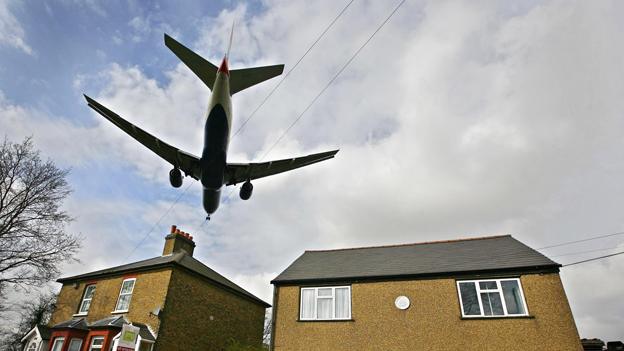
And taking sides has sometimes been seen to come at a cost for politicians. When Justine Greening was replaced as transport secretary in 2013, many commentators put it down to her strong opposition to a third runway at Heathrow.
The consultations will undoubtedly have taken time to wade through. The latest one alone had 70,000 submissions.
But John Longworth, the director general of the British Chambers of Commerce, says the UK is "crying out for more airport capacity" and the government needs to "act immediately" to implement the commission's recommendations as soon as they are made.
"Further delays are not an option. The UK has a troubling trade deficit and, to fix that, we have to kick-start a revolution in international trade and exports. To help do so, we need more airport capacity serving more markets around the world, and the sooner the better," he says.
The BBC's Kamal Ahmed: "The new government will have to take this most controversial decision"
Airport expansion will be politically controversial for David Cameron's government.
In his acceptance speech on being elected MP for Uxbridge, Boris Johnson said he would lie down "in front of those bulldozers and stop the building, stop the construction of that third runway" at Heathrow.
What's precisely going to happen with HS2?
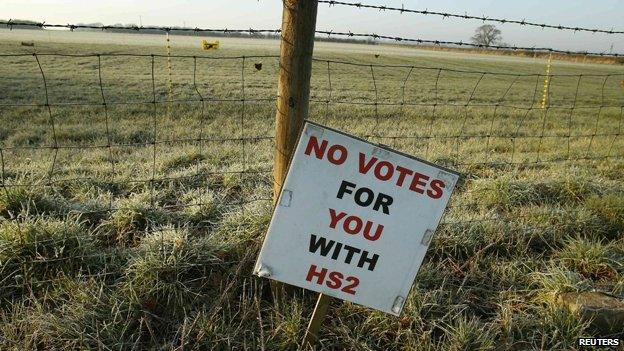
The proposed high-speed rail network HS2 between London and the North of England has long been a controversial idea. The Y-shaped route would travel from London to Birmingham, before splitting to reach Leeds and Manchester - with the possibility of later extensions to Scotland, Newcastle and Liverpool.
But the core proposals are due to be constructed in two phases, with the London-Birmingham route to be completed by 2026, and Phase Two by 2032. The main arguments in favour of HS2 include increasing railway capacity - with the West Coast Main Line particularly under pressure - and rebalancing the economy. The idea is that northern cities will be boosted by improved transport networks, therefore lessening the north-south divide.
But there are several key objections. Some doubt the supposed financial benefits of the estimated £50bn investment, while others are against it on environmental grounds or the fact that the proposed line would destroy their homes, farms or villages. A coalition of 18 local councils also formed to oppose the bill, naming the group 51m after the alleged £51m the project will cost each local authority (based on original lower proposals of £33bn overall cost).
But one reason it didn't register highly on the election agenda was because all three of the traditional main parties supported it. Having originally had the idea for a high-speed link, Labour had appeared to become lukewarm after the Conservatives took it on, but never turned to outright opposition. The Lib Dems promised to press ahead, leaving only UKIP and the Greens directly opposing it.
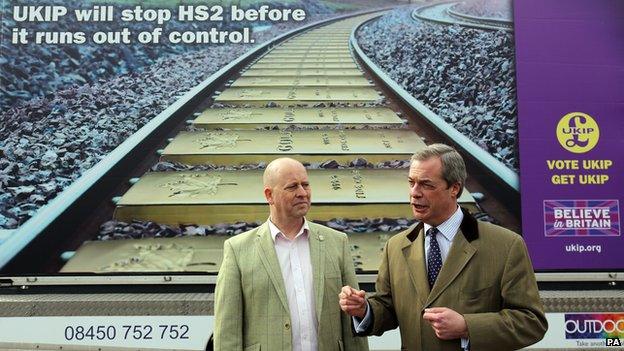
UKIP opposed HS2 in their election manifesto
Now with the Conservatives' majority - and manifesto commitment - it's hard not to see at least Phase One passing.
So far only that phase is going through parliament. Expenditure for surveying and design work has already been authorised. The bill is currently at the select committee stage, a quasi-judicial process in which petitions against it are heard. Nearly 2,000 people either directly or indirectly affected by the HS2 plans will have their say, with about 500 seen thus far, explains Neil Caulfield, a House of Commons clerk to the HS2 Hybrid Bill Select Committee.
But the "principle" of a high-speed railway was approved last year, so the committee can only recommend changes that do not affect the "broad route alignment", Caulfield says.
"The bill is now almost certainly going ahead, subject to Third Reading and approval in the Lords," he says. In March 2015, a report by the House of Lords Economic Affairs Committee stated that the government had "no convincing case" for the rail line, suggesting there were cheaper alternatives.

More from the Magazine
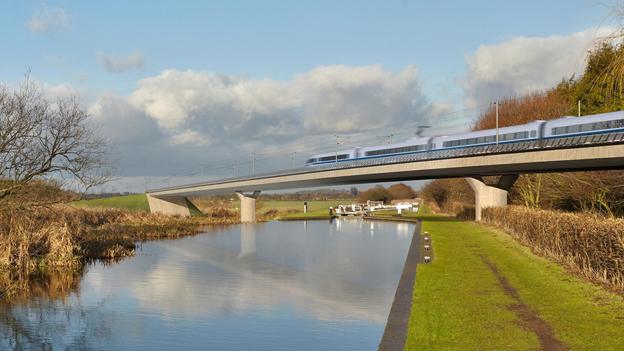
Labour has cast doubt on the future of HS2 but just what are the arguments for and against a new high-speed rail link between London and the north of England?
What are the arguments for and against HS2? (September 2013)

The select committee's work on the bill will restart once it is - as expected - formally re-presented after the Queen's Speech, Caulfield says. "We expect at the moment to finish the Commons select committee stage of Phase One within about a year from now."
The government wants to begin construction in 2017. "For that to happen the bill will need to complete all its Lords stages in the remainder of 2016 and the start of 2017," Caulfield explains. "This is challenging but feasible."
The exact route of Phase Two - from Birmingham to parts of the North - has yet to be confirmed but it will require another, separate bill, which Caulfield predicts will be presented to Parliament next year.
Will there be new nuclear plants?
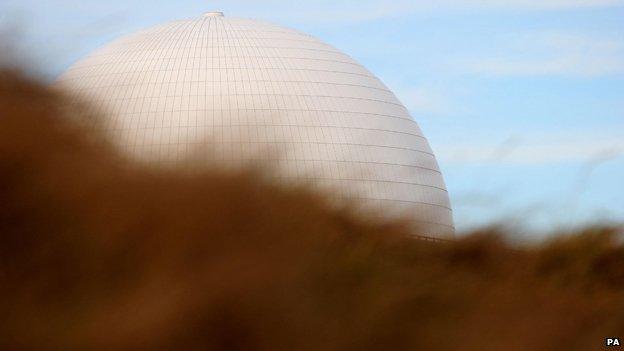
Sizewell nuclear power station
The UK's - and the world's - first commercial nuclear reactor was opened in 1956 at Calder Hall in Cumberland, sparking a wave of construction that led to nuclear power plants contributing about 25% of the UK's annual electricity by the late-1990s. But this number has been on the decline.
Degrading old plants have been shut down and not replaced. There's not been a new nuclear power plant built for 20 years, and nuclear power now provides less than 20% of UK electricity. The UK now has 16 active nuclear reactors at nine plants.
The chief arguments in favour of nuclear energy are increasing the UK's energy self-reliance and providing a non-fossil fuel source of electricity. Critics point to safety concerns and nuclear waste, as well as the possible risk of terrorist attack.
But despite energy prices being a regular debate topic over the past five years, they didn't feature much during the election period. "Timing favoured the Conservatives," says Tony Lodge, an energy expert at the Centre for Policy Studies.
The collapse of oil prices resulted in an immediate consumer retail dip in prices, which "completely negated and neutralised the debate", Lodge says, a boon for an issue that risked being a major point of contention - particularly for the Conservatives - up until autumn of last year.
Nevertheless, the Conservative manifesto pledged a "significant expansion" in new nuclear energy. The centrepiece of this pledge will revolve around a new plant in Somerset - Hinkley C. In 2013 the coalition government agreed to the £24.5bn construction of two new nuclear reactors at the site, which is projected to be operational by 2023.
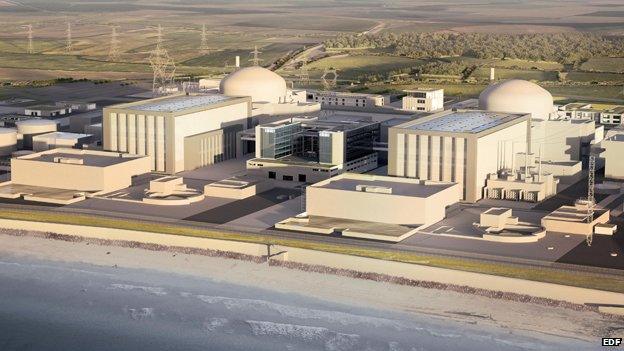
An artist's impression of the proposed Hinkley C power station
The deal with French state-owned company EDF Energy - along with Chinese investors - has not been without complications. To mitigate EDF's risk in building a nuclear power plant that will not see any return for at least 10 years, the government agreed to "guarantee" a cost of £92.50 per megawatt hour (Mwh). It means that if the market price of electricity falls below this level, the government - and in turn the taxpayer - will make up the difference.
There have been some objections to this "subsidy"-style model and it faces possible legal action from Austria, although it was approved by the EU.
Low-level construction has already begun at Hinkley but EDF caused a stir by halting all work on its ground preparation just before the election, explains Lodge. "All they were really doing was waiting for the result," he says. Now that the Conservatives have remained in power, Lodge says, the next hurdle is EDF signing off with their Chinese partners and starting proper construction.
Despite the Conservative pledge for "significant expansion", Lodge predicts that in the short-term all eyes will be on the Hinkley model. "The remaining nuclear power stations in Britain have all been given a life extension by the government, so they'll continue to generate electricity - [although] they're quite old now - for the best part of five to seven years."
There are a number of sites in England where in theory you could build more plants, he says, suggesting Sellafield in Cumbria, or replacing Sizewell in Suffolk. But the SNP's near total domination of the Scottish political landscape, coupled with their opposition to new nuclear power, means that it's extremely unlikely there will be any nuclear development there in the short-term. "At the moment Hinkley is the only real project on the stocks," says Lodge, who thinks projections of a 2023 opening are ambitious, with a few years later more likely.
What is the UK strategy on climate change?
Nine years ago, before the banking crisis hit, David Cameron campaigned in local elections on an explicitly environmental ticket. "Vote blue, go green" was the slogan he used. Now the country has finally voted in a majority Conservative government, what will happen?
Climate change was an issue little discussed by the mainstream media during the election campaign, dominated by questions of economic competence, the NHS and leaders' personalities. And under the coalition, the Department of Energy and Climate Change (DECC) was overseen by the Liberal Democrats.
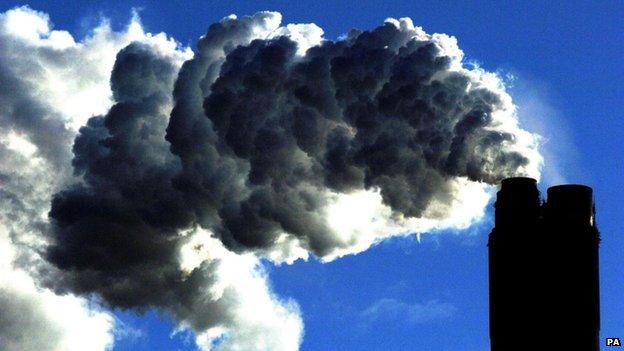
The Conservatives, who now have sole power over policy, promised in their election manifesto to push for an international deal that "keeps the goal of limiting global warming to two degrees firmly in reach". Nationally, the party pledged to "cut emissions as cost-effectively as possible".
Amber Rudd, who takes over responsibility for DECC in David Cameron's reshuffle, will attend a United Nations summit on climate change, external in Paris in December as part of the European Union delegation.
The UK government is signed up to the EU target of cutting emissions by 40% from their 1990 levels by 2030. Earlier this year, Cameron and his then rival party leaders, Labour's Ed Miliband and Lib Dem Nick Clegg, also signed a pledge, external to end the use of coal-fired power stations to produce electricity.
Rudd, who served as a more junior minister at DECC before the election, is said to be in favour of expanding renewable energy usage. This chimes with the Conservatives' stated aim of funding "promising new renewable technologies and research" but only where they "clearly represent value for money".
In their manifesto, the Conservatives vaunted the government investment in recent years in offshore wind farms. But they promised to "halt the spread of onshore wind farms", which can be unpopular locally, while acknowledging they were making a "meaningful contribution to our energy mix" and had "been part of the necessary increase in renewable capacity". They pledged to end new public subsidy for them and change the law so that "local people have the final say" on applications.
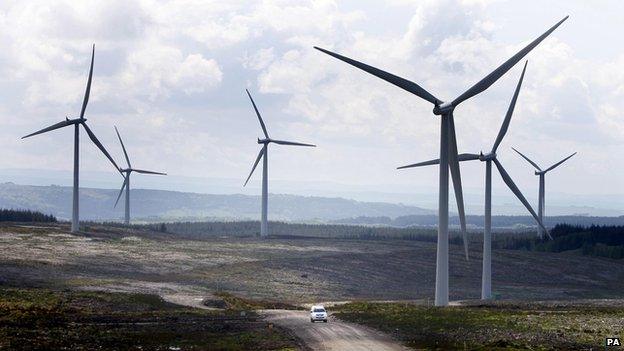
On a domestic level, the Conservatives set a "goal" of insulating one million more homes over the five years of this parliament in an effort to cut fuel poverty, pollution and wastage.
The Lib Dems no longer dominate climate change policy. How far will Rudd go towards making Cameron's 2006 pledge come true?
Is the UK still going to intervene abroad?
Defence does not rate among the main concerns with voters, according to opinion polls, external, although it is considered to be the primary duty of any government. So it was not a major talking point during the campaign.
Still, in their election manifesto,, external the Conservatives addressed the UK's global role, promising it would have a "stronger voice… on the world stage".
The document pledged to work to uphold the "sovereignty, integrity and capacity" of Ukraine and to stand "shoulder to shoulder" with Nato allies, especially those geographically closest to Russia.
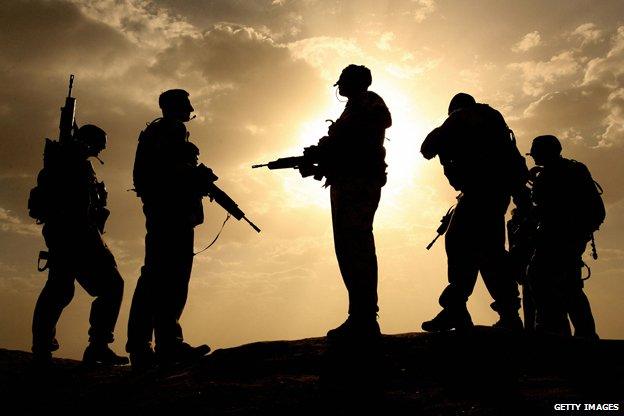
It said there would be a "comprehensive political and military strategy to defeat" Islamic State (IS).
But will David Cameron and his colleagues have the manpower to wield the influence suggested, particularly as the Ministry of Defence's budget isn't ring-fenced against spending cuts?
On this issue there was a clear pledge. The size of the regular armed forces would not fall below that already agreed, including keeping an Army of at least 82,000 personnel. The Conservatives pledged to increase the number of reservists to 35,000 - again, as previously agreed.
The unexpected election of a single-party government means there is a stronger emphasis on keeping manifesto promises than there would have been under a coalition, which would have allowed more room for alteration, says Prof Malcolm Chalmers, research director of the Royal United Services Institute (Rusi).
He adds that a commitment to a 1%-a-year real-terms increase in equipment spending and the pledges on personnel mean there is not much scope for cuts overall. In fact, he envisages a 0.5% to 1% real-terms increase per year in the defence budget over the next five years.
The UK has been involved in air raids against IS in Iraq since last year, but what if another commitment like this came up? It would be "doable", says Chalmers, but it would be "hard" to maintain if it continued for a prolonged period and if other requirements arose.
"It's very difficult to predict in this area," he says. "It feels to me as if we are likely to be involved in a number of relatively small-scale commitments."
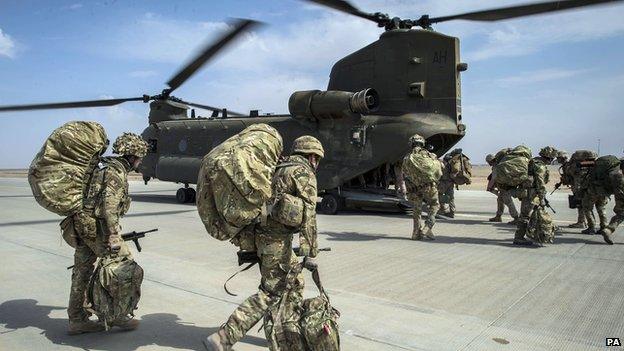
UK troops withdrawing from Afghanistan, 2014
One of the coalition's biggest defeats of the last parliament came in 2013 over proposed air strikes in Syria against President Assad. Should the government want to overturn this - and there's no suggestion of that at present - it's likely to prove very difficult politically, says Prof Chalmers.
"Iraq is complicated enough, but at least there's a legitimate government to back against an enemy," he says. "In Syria it's not clear. One year we are contemplating intervention against Assad, then the next an intervention against his opponents (IS)."
Cameron has said he has not contemplated the use of British combat troops on the ground in Iraq, adding: "The lesson to learn from previous conflicts is that we should play the most appropriate role for us."
The modern convention is that Parliament votes before troops are committed to operations. While the manpower situation looks set to stabilise, although at a level which some analysts say leaves too many "capability gaps", appetite for intervention following the wars in Iraq and Afghanistan is limited.
The UK Strategic Defence and Security Review, to be published later this year, will give more detail of future thinking.
Reporting by Justin Parkinson, Vanessa Barford and Tom Heyden.
Subscribe to the BBC News Magazine's email newsletter, external to get articles sent to your inbox.